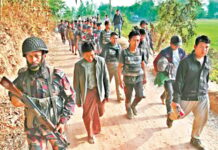
United Nations High Commissioner for Refugees Filippo Grandi, third from left, walks during a visit to a Rohingya refugee camp in Cox’s Bazar on Monday. — AFP photo
UN refugee agency chief Filippo Grandi on Monday stressed an urgent solutions to the statelessness of minority Muslims in Rakhine state by ensuring their Myanmar citizenship and creating a conducive environment for sustainable return to their ancestral home.
Keeping the protracted Rohingya problems unresolved for long might instigate causes that might not be good for stability in the region, he warned at a press conference in Dhaka on the conclusion of his 10-day visit to Myanmar, Thailand and Bangladesh.
‘What if we don’t give a good future to these people’, Filippo Grandi said, ‘in our day and stage, this is not a good recipe for stability. There are many bad people out there who can manipulate this. There is also a global phenomenon. We have to be very careful about disenfranchising people’.
He said easing and simplifying the process of citizenship would unblock their access to opportunities and services in Rakhine state, and it would have a positive impact among Rohingya people in Bangladesh.
Situation of human rights for Muslim minority in Rakhine state ‘is very dire’ with no citizenship, no freedom of movement, no freedom of association and no freedom of congregation, Filippo Grandi said.
‘This in turn aggravates poverty. These people have not able to move or travel, have difficulty in having access to services and employment. Situation of poverty has already become worse. Increase malnutrition and increased maternal mortality rates are worrying signals’, he continued.
The best solution for them, he suggests, ‘is to go back to their country, peacefully, voluntarily, and in a condition that permits the return…not as return as they did in the past, and after few years people were obliged to flee again. They need sustainable return.’
On relocating Rohingya people to an island-camps, he said, relocation of refugees ‘happen in many countries’. But relocation should be in places with opportunities and the process should be voluntary.
‘Struck by sense of despair of refugees in Cox’s Bazar’, he said in a tweet after visiting Kutupalong camp, ‘Tangible progress in Myanmar and better opportunities can restore trust in the future’.
At least 74,000 minority Muslims, out of 92,000, widely known as Rohingyas, who fled indiscriminate killings, rape, arson and violence by Myanmar security forces in Rakhine state, entered Bangladesh since October 9, 2016, according to UNHCR estimates.
Some three lakh Myanmar nationals have been living in a refugee-like-situation in makeshift shelters in Cox’s Bazar for years while 33,148 registered refugees from Myanmar have been living in camps for years in the bordering districts of Bangladesh.
UNHCR officials Shinji Kubo and Vivian Tan were also present at the press conference.
Source: New Age









